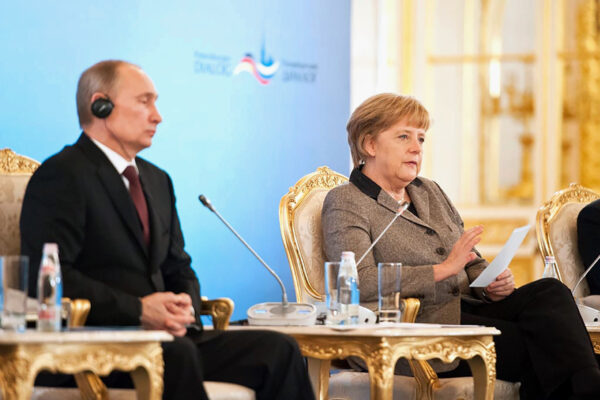
German chancellor Angela Merkel is traveling to Moscow on Saturday, officially to discuss the conflicts in Libya, Syria and Ukraine, as well as the tension between Iran and the United States, with Vladimir Putin.
Hanging over the meeting will their countries’ deteriorating relations with the United States.
The meeting
Ideally, the two leaders would come up with a plan to save the 2015 Iran nuclear deal, from which the United States withdrew in 2018. Short of that, Merkel will try to gain Putin’s support for her mediation efforts between Iran and world powers.
As a permanent member of the United Nations Security Council, Russia is “indispensable” to solving the crisis, according to a German government spokesperson.
Germany’s role is less clear. It has no desire to put more boots on the ground in the Middle East. (120 German soldiers are in Iraq.) It has suggested that the killing of Iranian general Qasem Soleimani by the United States may have been justified, which doesn’t give it much credibility in Tehran. Iran is already reneging on some of the terms of the nuclear pact, although it still allows international inspectors to verify that its program is peaceful.
Besides the crisis in Iran, Merkel and Putin are due to discuss the conflicts in Libya and Syria. Turkey has sent fighters to the former, where Russia backs the opposing side in a civil war. Germany’s role is limited there too. Foreign Minister Heiko Mass visited Libya in October, but his country did not contribute to the 2011 NATO mission that toppled Muammar Gaddafi.
Germany’s defense minister, Annegret Kramp-Karrenbauer, has suggested establishing an internationally controlled security zone in Syria in cooperation with European partners as well as Turkey and Russia. Merkel has called the idea “promising”. Other Western leaders are less enthusiastic. Given America’s withdrawal from Syria, such a plan cannot succeed without Putin’s blessing.
In Ukraine, where Germany is an important player, progress has been slow. Russia still occupies the Crimean Peninsula. A meeting of the leaders of France, Germany, Russia and Ukraine in Paris last month failed to produce a breakthrough. Ukraine and Russia have agreed to hold elections in the separatist-controlled provinces in the east, but they haven’t agreed when. Sporadic fighting continues in the region.
Easing tensions
Not on the official agenda are Germany’s and Russia’s relations with the United States.
Soon after Donald Trump’s election, Merkel recognized that Germany can no longer rely entirely on the transatlantic relationship. Trump’s demands for higher defense spending and a greater European role in the Middle East make policymakers in Berlin nervous.
Even before Trump, the Germans felt the United States needlessly created friction in East-West relations by deploying troops to the Baltic states and Poland. Merkel and Putin share an interest in deescalating the military build-up on the EU’s eastern flank.
American sanctions on Nord Stream 2, a new gas pipeline in the Baltic Sea, have sowed further mistrust. They haven’t changed the fact that Germany needs Russian oil and gas and Russia needs Western investment and technology. Merkel and Putin may want to find a way around these sanctions, although their options are limited. There are few companies that could finish the pipeline.
The same goes for international sanctions imposed on Russia after it invaded the Crimea. While some Western firms have found ways around the embargo, which is believed to have cost Russia hundreds of billions of dollars (PDF), lifting sanctions would undoubtedly increase capital flows into Russia. But for that to happen, Merkel and Putin need to find a solution to the conflict in Ukraine.
Clear-eyed
Does this mean Merkel agrees with French president Emmanuel Macron that Russia isn’t Europe’s number-one enemy and the two sides need to restore cooperation?
Unlikely. Merkel has been clear-eyed about Putin for many years. She is also approaching the end of her political career, having promised not to contest the next election. She is not going to turn Germany’s Russia policy around now.
But given Trump’s unfriendly attitude toward Germany and the escalations in North Africa and the Middle East, she may also believe there is room to improve relations and work with Russia on crises outside Europe.
